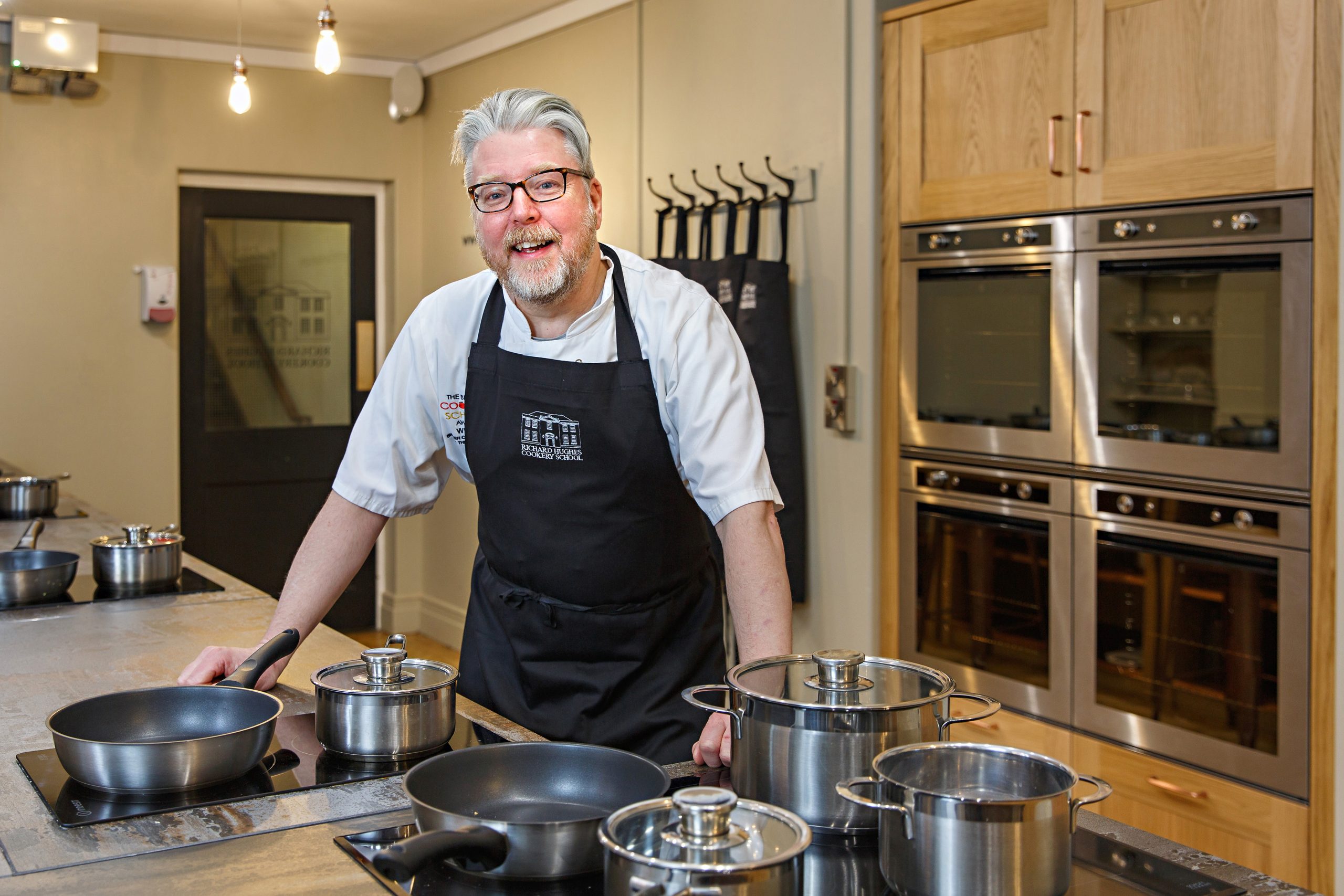
The Norfolk Foodie – Richard Hughes
I do not think that it is an exaggeration to say that Richard Hughes is a true Norfolk institution. From his days at Number 24 in Wymondham to the famed Lavender House in Brundall Richard has, for the past 10 years, been the man behind the resurgence of The Assembly House. One of our county’s most-loved chefs, Richard gives a searingly honest interview, albeit it one that barely scratches the surface, as we talk about his obsession with cooking, his dedication to his craft, and living through the moment when being a chef became sexy.
“I love what I do,” smiles Richard. “I have been incredibly lucky in my life, as my whole career has been based around something that I love. In my head, I didn’t think that I had an inclination to be a chef when I was younger, but I had the Marshall Cavendish Cookery Course when I was 14. My mum passed away recently, and I found the books. So clearly, there was always an interest there.”
Richard was born in The Fens, laughing as he tells me that he was born on the right side of the border. “I was born in a little place called Christchurch in The Fens. My dad worked on the land, and our house marked the border between Norfolk and the Isle of Ely. I was born on the Norfolk side, my brother the Cambridge side!”
Looking for more opportunities than The Fens could offer – the nearest shop was seven miles away from the Hughes’ home, and the family had a 1.5 acre allotment where they grew all their fruit and vegetables – Richard left home at 15. “I saw a job in the paper for a trainee chef at the Imperial Hotel in Gt Yarmouth, and I went for it. That was in 1977 – and I haven’t stopped working since!
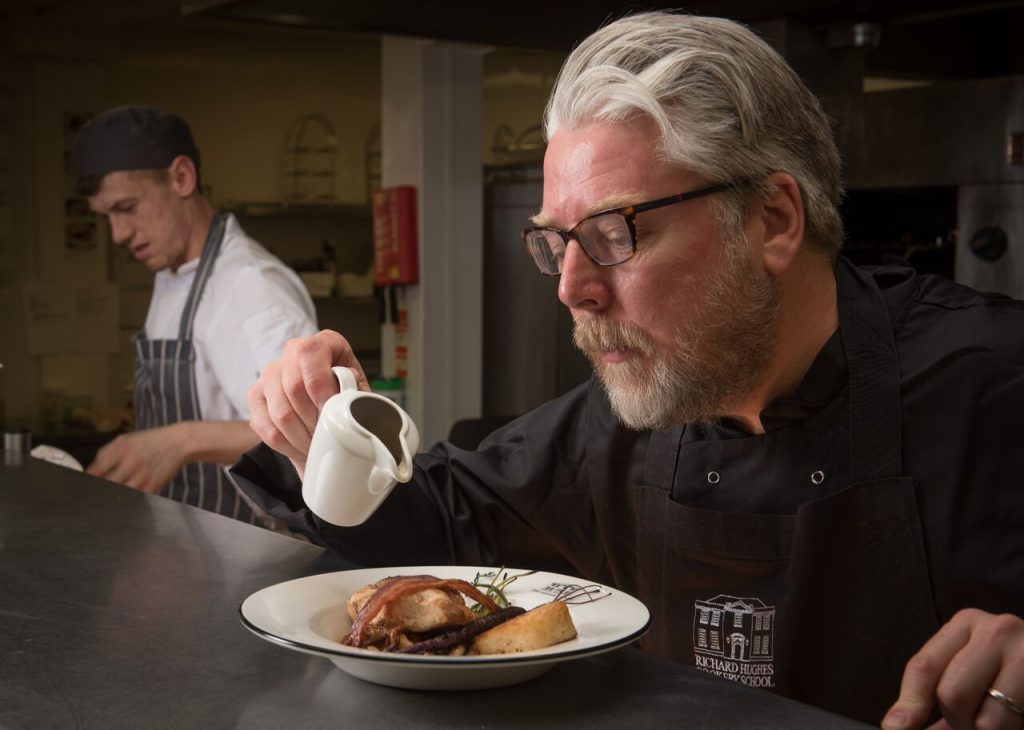
“I lived in Great Yarmouth and being a very green boy coming from where I did, it was like being dropped on the moon! It was the biggest culture shock. I worked for Mr Mobbs, who owned the Imperial Hotel; his son, Nick, still runs it and even now, I see Mr Mobbs every couple of months. I was part of the apprentice scheme, where you did two days in the kitchen, one day in college, and two days on the pot wash. In the late 70s, it took four years to complete the apprenticeship – now you can do it in a year! A lot of great Norfolk chefs started their life at Imperial, including Danny Smith from The Ingham Swan/Wildebeest, Jonathon Griffin at Number Twenty Four, Wymondham, and Mark Dixon from the Kings Arms in Fleggburgh.”
Richard describes the excitement of working in a kitchen as “mind-blowing”, telling me that once he finished his apprenticeship, he did an advanced course. “I went to college one day a week for seven years,” he continues. “I would have been set for life at the Imperial. I had married my first wife, Sue, at 22 and I thought my life was sorted. Then I realised that I had already been there for seven years and I needed to make a move, to look for the excitement I’ve always needed in my life.”
In 1984, Richard left the Imperial and went to the Michelin-starred Rookery Hall Hotel in Nantwich, “It was an incredibly grand hotel,” recalls Richard. “The mid-80s were a boom time for country house hotels. The Queen Mother and Margaret Thatcher were both visitors, and the hotel was next door to the Rolls Royce factory; if someone bought a Rolls, they came to the Rookery to celebrate.”
Richard does, however, admit that it was tough in the kitchen at the Rookery with that chef culture we know so much about being prevalent then. “It was a proper eye opener there,” he explains. “The Imperial was such a family environment, and it was a real change to go there. It was during the miner’s strike, and it was a difficult time altogether. I used to come home to Norfolk every fortnight and drive through the mining areas. It was not a great time.”
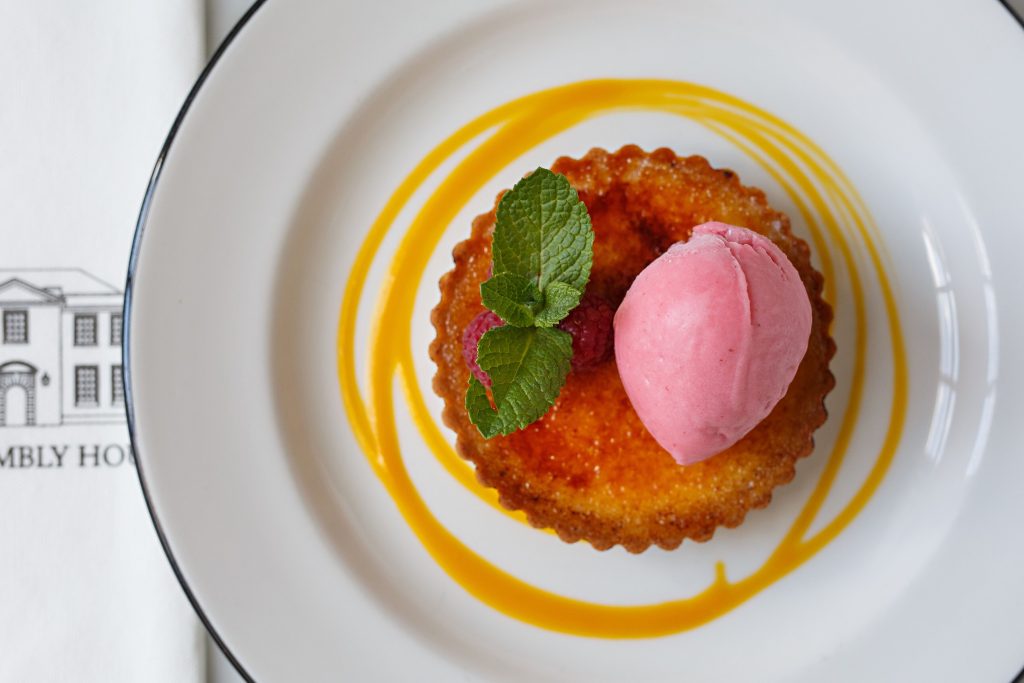
After six months, the hotel hit rocky times and Richard was made redundant and, with the recession biting, he needed a job. “I opened up the Eastern Daily Press and the first job I saw was Head Chef at the Theatre Royal in Norwich,” he recalls. “I applied and got the job. I learned more about life through the Theatre Royal than I ever imagined – I don’t mean about cooking, but about people and customers.”
The Theatre Manager at that time was the iconic Dick Condon, and Richard credits him with helping him to become the man he is today. “I was painfully shy at that time,” he says. “Dick had a way of making people feel great about themselves. He taught me how to deal with people, how to market yourself, and how to sell to people – I really learned all about how a business works. He said that the customer is always the most important thing, not what you want to do, and that is so true. Too many chefs love to cook their own food and do it for themselves – not necessarily because that is what the customer wants. It is all about giving the customer what they want and making them happy. They come to your restaurant as they want to have a nice time, and it is up to you to ensure that they have that.
“Dick always used to say to me that you have just got to get people in the door, even if they are coming in just to use the loo. I took a lot of his ideas with me when I went to The Assembly House, and they have served me well.”
Richard stayed at the Theatre Royal for three years before going to South Walsham Hall in 1988, which is no longer there, and 18 months later Richard went to the Friendly Hotel, and had a three-month ‘stage’ at The Ritz in London’s West End. “The Friendly Hotel was another pivotal moment for me – again, I learned so much there about the business side of running a hotel,” explains Richard. “You can be the best cook in the world, but if you can’t make any money from it, then you are not going to last. You only have to look at the number of big-name chefs who set up alone, only to go bust a few months down the lines. I always say that most chefs only see up to the hot plate. They are obsessed by their food and only that, which is fine at home, but not when you are running a business.”
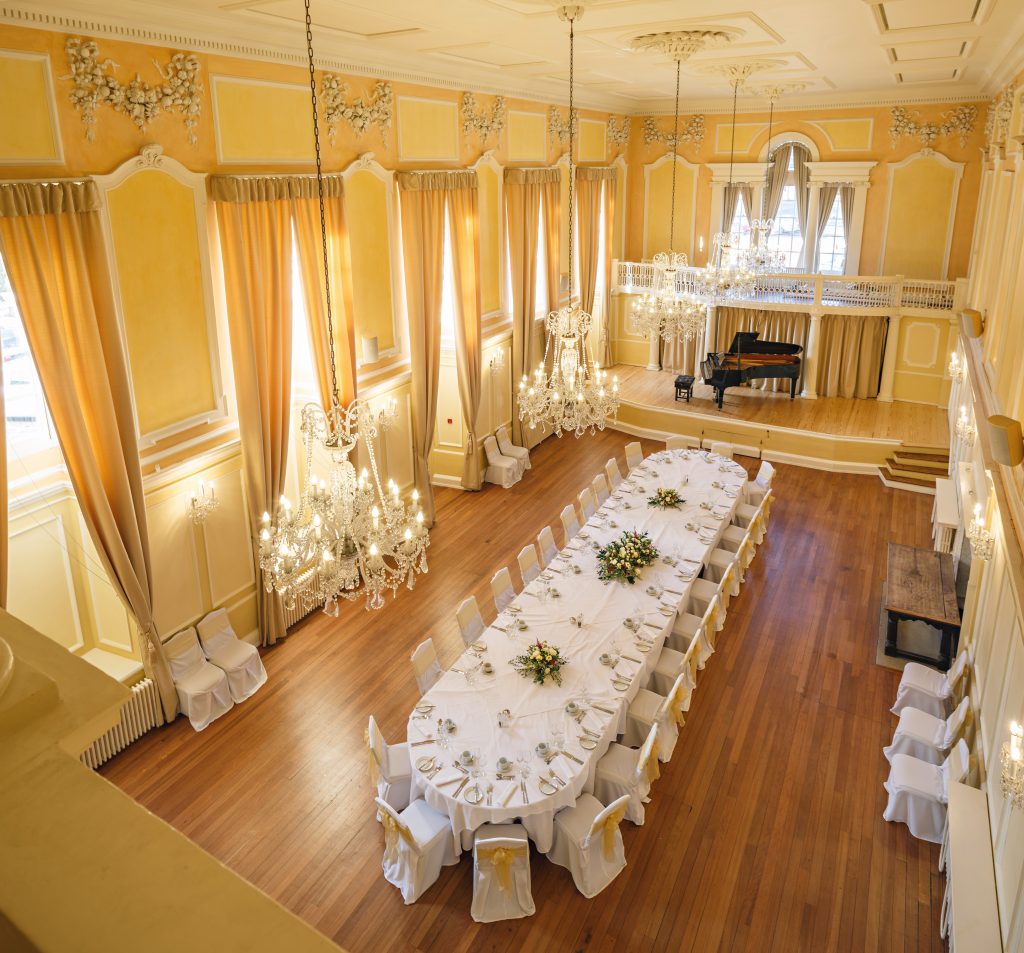
Richard adds that it was around this time that it became really exciting to be a chef. “Before then, being a chef was a job you took as a last resort and almost overnight, it became something sexy,” he laughs. “This was when chefs such as the Roux brothers and Marco Pierre White began to do glossy cookbooks, and chefs began to lose their anonymity. We all thought that it would be a flash in the pan, but it has grown and grown. On a local level, as well, it was also exciting as Adlard’s had opened up and earned Norfolk’s first Michelin star. It was a good time to be a chef.”
However, driving all of this was a long-burning desire Richard had to work for himself. “I always said that I wanted my own restaurant by the time I was 30 years old – and I just made it by two weeks!
“I was obsessed with it, with this dream. I had £18,000 to spend and I found Number 24 in Wymondham, which was £17,500. It was a deli, and it was the only place for sale in Norfolk at that price at the time – so I went for it! By now, our family had grown with daughter Stacey joining her elder sister, Alison, who was born when we first moved back to Norwich. They were two and four-years old respectively. Looking back, I missed out on a lot with them, but I was just obsessed with the idea of my own restaurant.”
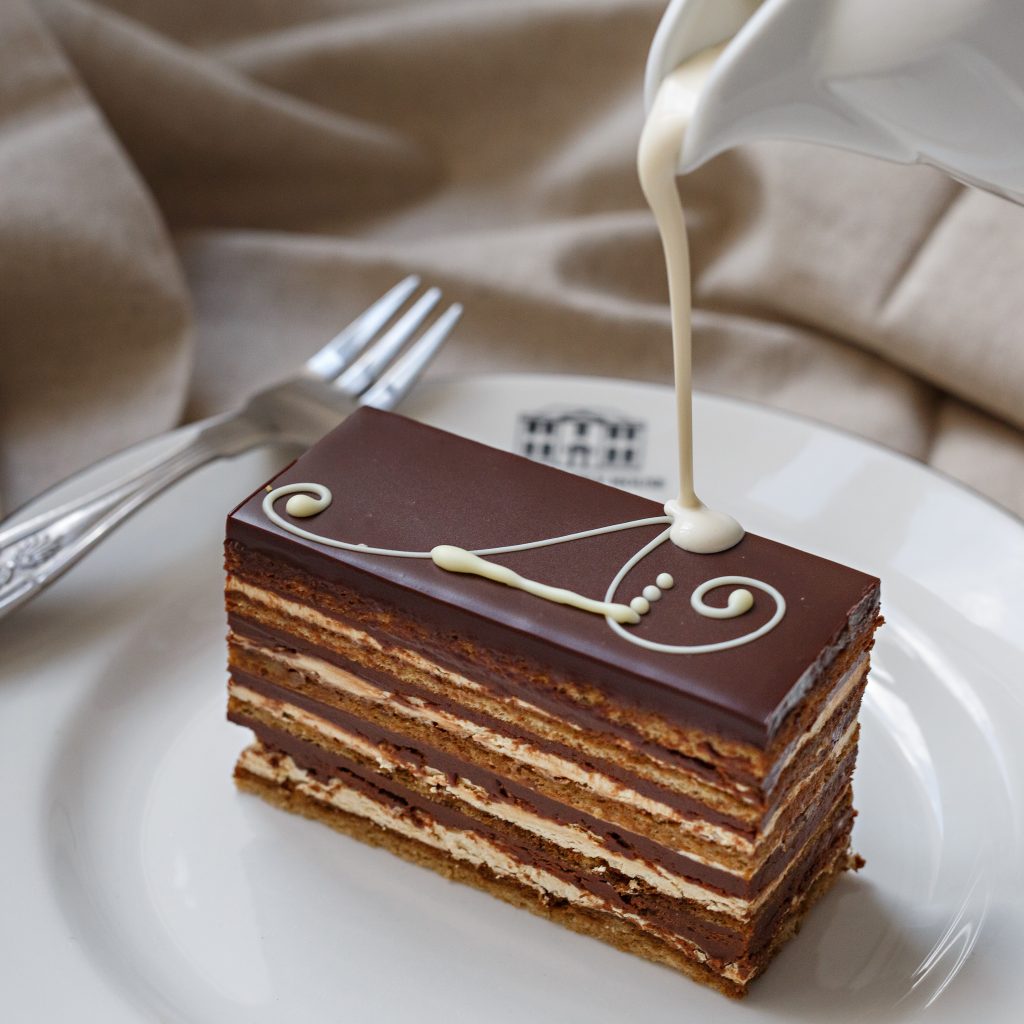
When Number 24 opened, the family had just £180 in the bank, and it was all hands on deck to get it ready for the public. “My mum made tablecloths, and my dad painted the walls. We had patio garden furniture in the restaurant, and when it got really busy on a Saturday, we would bring in our own dining table from home.
“This was in 1991. Adlard’s, which was originally in Wymondham, had moved to Norwich. The country was in recession, but we were busy! People had got used to eating out in Wymondham, and we offered a three-course prix fixe menu for £12.50. Even when times are tough, people still want to go out and celebrate for birthdays and anniversaries, and they save up for this. I think that you must play to your strengths, and also offer value for money.”
The food Richard cooked at this time was along classical French lines. “I loved to do a confit duck, terrines, and tarte tatin,” he explains. “You would call it ‘bistro food’ now. But that was the style I cooked, and there were just two of us in the kitchen, doing 30-40 covers a night. My ideal dinner would be a fish soup with rouille, followed by confit duck and then my mum’s Eccles cake with a bit of smoked dapple cheddar.”
Richard entered the National Chef of the Year Awards and got through to the finals three years in a row; in 1992, he was up against a certain Gordon Ramsey. Richard also won the Catey Menu of the Year Award in 1994, something that he remains enormously proud of. “I am obsessed with menus and books and winning that Catey really put us on the national map,” says Richard. “I used to love entering awards, and we are so lucky to have won so many. Some mean so much though – and the Catey is a definite highlight.”
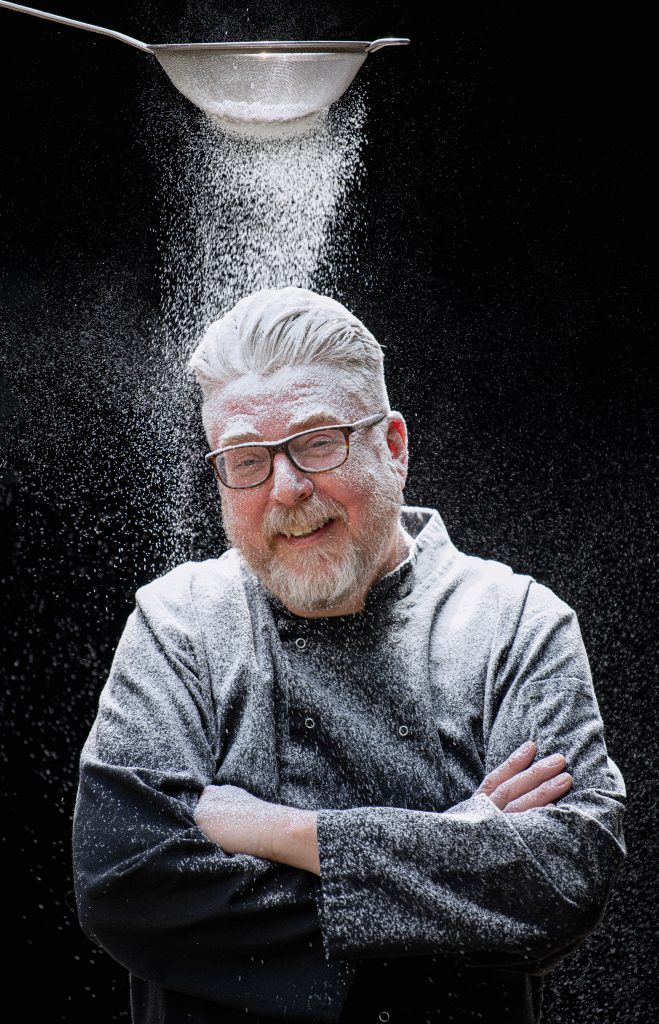
Asking Richard about that time at Number 24, he says: “It was relentless. I had no doubts about what we were doing – we were so busy. We were open six days a week. It was real skin of the teeth stuff. We did outdoor catering – a wedding in the day, and then back to the restaurant for dinner service. We made a living – but we didn’t make any money.
“What drove me at that time? Fear. It was incredibly hard. I always say that hard work solves most problems – and that is the issue we have at the moment with COVID-19 as we cannot work harder. I have had a nice time at home, but I am missing that structure.”
Richard admits that he rarely says no to anything. By now, he had a column in The Caterer and did work on Radio Norfolk that led to being on television. “I didn’t turn anything down, and I think that helped me a lot,” he says. “People have always said that I am ‘lucky’, but I don’t think that there is any luck in it. I would respond to people, to the press, straight away. That meant that when they asked a question, they got an answer from me rather than going elsewhere. I got that attitude from Dick, and it has stood me in good stead. Of course, with social media now things are very different, but the ethos remains the same.”
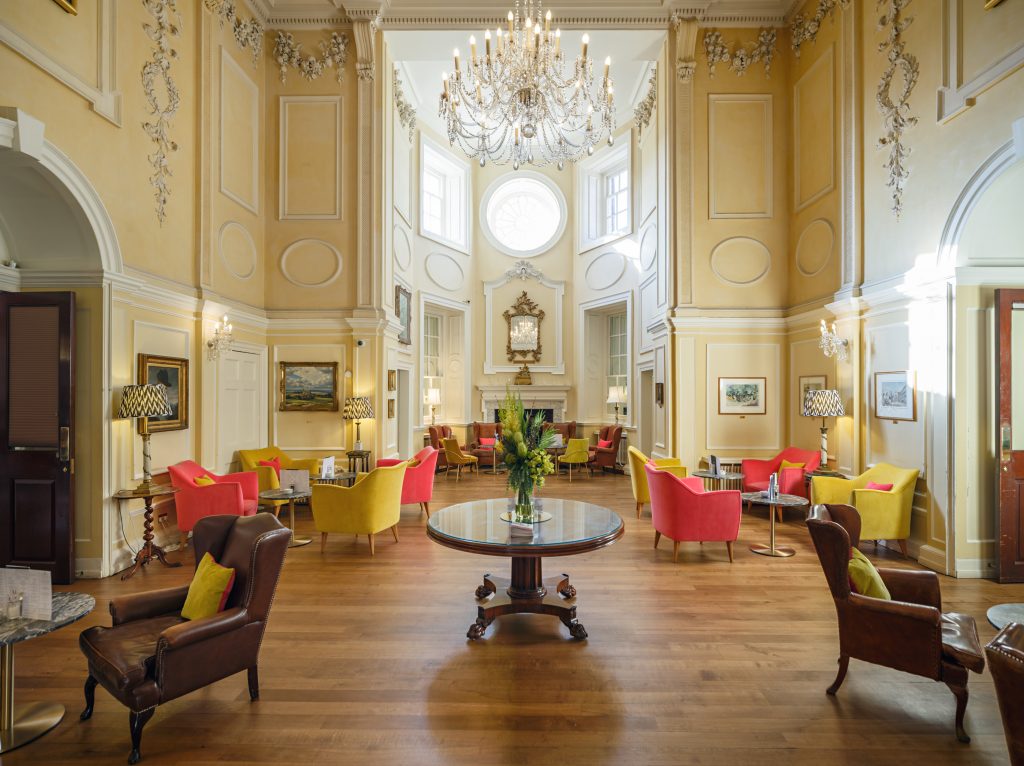
After being at Number 24 for 11 years, Richard set off on a different path. “I loved my time there,” he recalls. “As a job, cheffing becomes more difficult as you get older as it is so physical, I don’t know many chefs over the age of 35 still doing what I did at Number 24 – but I loved it there, and I learned a lot.”
However, it was a chance drive on the way back from a wedding that put Richard on to his most famous role to date – that as owner of The Lavender House in Brundall. “We went past The Old Beams Restaurant and it was for sale. It was a beautiful building – 16th century and thatched, and we moved heaven and earth to get it, including selling our house. In 2001, we managed to buy the freehold building. This was when things really started to take off for us. And I also became more involved with the front of house as well as being in the kitchen. It showed me a different side of how things worked – and reinforced what Dick had said all those years earlier about the customer being the most important thing.”
One highlight for Richard at this time was when Rick Stein’s Food Heroes filmed at The Lavender House. “That was massive for us – and it is still repeated, even now,” smiles Richard. “It is lovely to get messages from people when it has been on.
“We also won at the first EDP Food and Drink Awards and it was there that I met Iain Wilson from Byfords. He asked me if I was ever interested in a pub to let him know. A few weeks later, we bought The Pigs at Edgefield and we went into business there. We also had a restaurant in Great Yarmouth. There was so much happening at this time.”
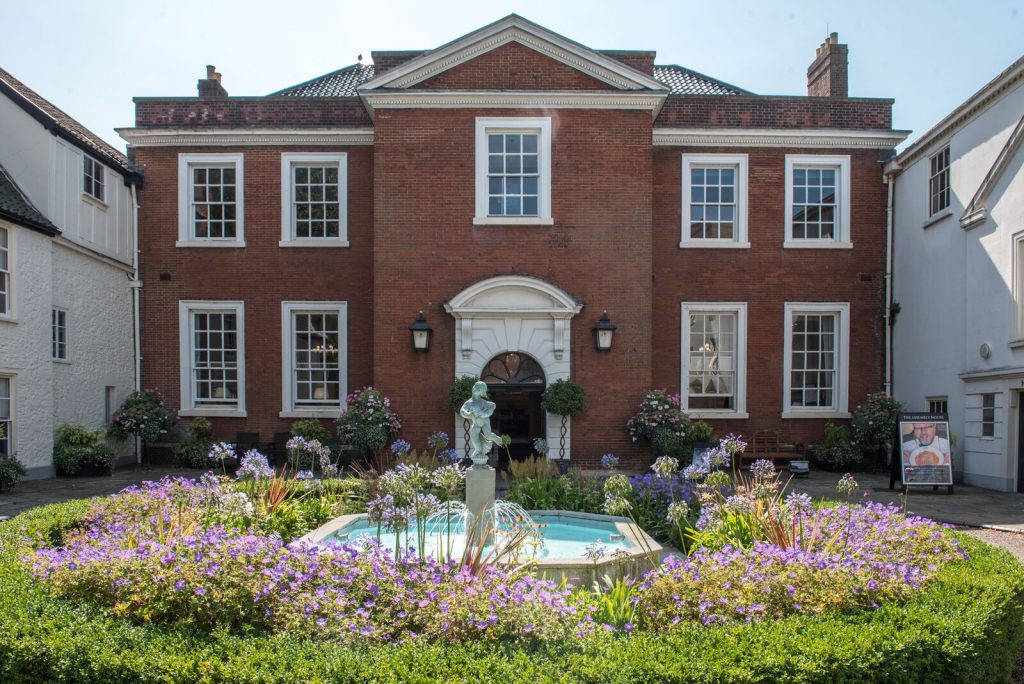
This included Richard setting up the Richard Hughes Cookery School and being named the inaugural winner of the UK Cookery School of the Year. Richard expands: “We were up against Gordon Ramsey, Tante Claire, Leiths Cookery School, and Rosemary Shrager – and we won it! I couldn’t quite believe that it was happening, it was amazing. We also earned two AA Rosettes for The Lavender House; I would obsess about the third…”
Richard adds that The Lavender House was all about service: “The front of house is key. You can serve mundane food but if the service is great, then the customer loves it. Equally, it can be the best food in the world but if the service isn’t good, then they won’t leave with a smile. The two best front of house staff I have ever had were Tony Masala from The Lavender House and Jamie Gooda from The Assembly House. Jamie was actually in the kitchen as a pastry chef, but I saw that spark and pulled him out!”
It was 10 years ago now that Richard took on The Assembly House, when he and Iain were approached by The Assembly House Trust to take over the business. Richard continues: “In the 1950s, The Assembly House was bequeathed to Norwich as a place for assemblies, but it still needed to make money. Parts of the building date back to the 12th century, and it truly is one of Norwich’s crown jewels. But it had not moved with the times and remained a place you went for high days and holidays. So, we took it on – and my first goal was to get people in through the door.”
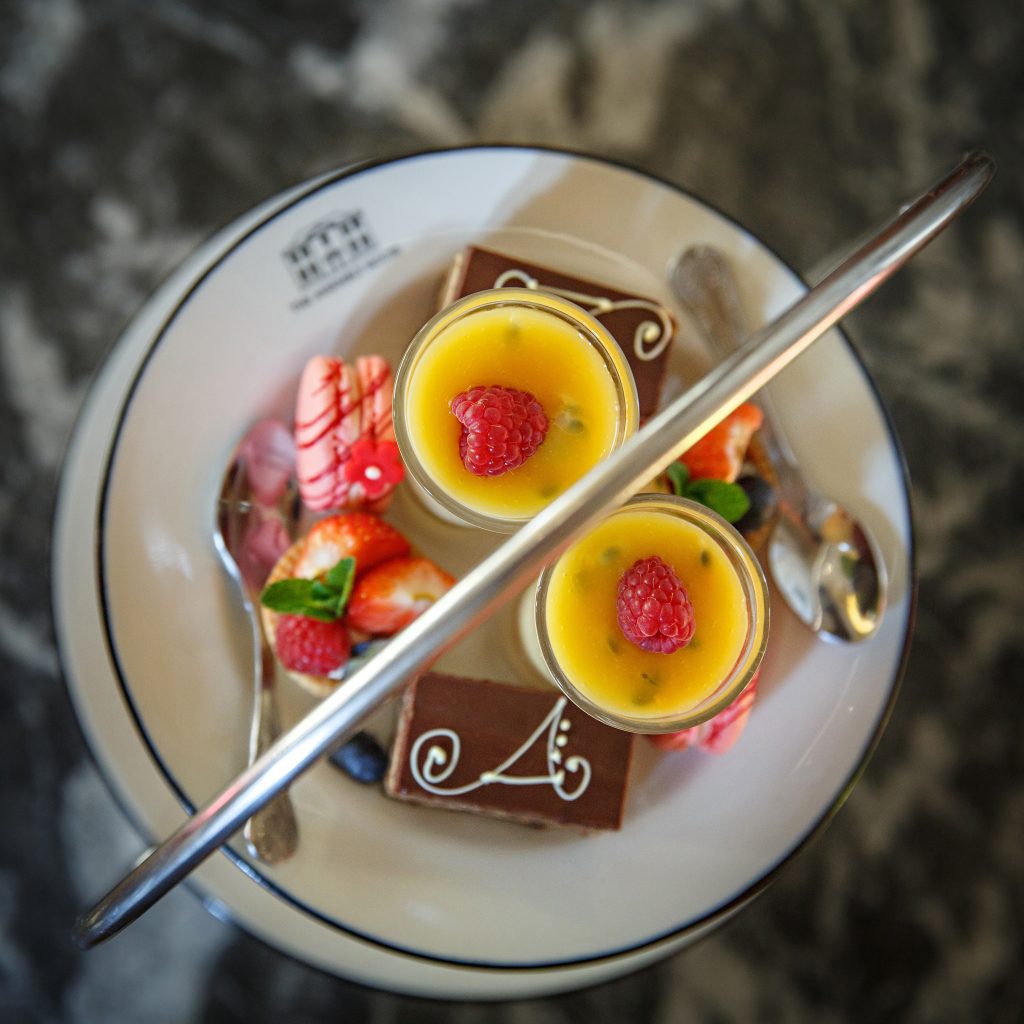
Richard reflects before continuing: “Being a chef is quite selfish really. It is a selfish trade. I am close to my daughters, but I was an absent dad until their late teens. I was working so hard because I was obsessed with the restaurant. It becomes all consuming. I can pretend that I am doing it to make a life for my family – but that is all it is, pretence. It is really only the past five or six years that I have found balance in my life.”
Part of that obsession saw Richard and Sue divorce 12 years ago. “When you are obsessed with something, there is no room for anything else,” he says reflectively. “Most obsessions last for six months – mine has been a lifetime!”
For seven years, Richard ran The Lavender House and The Assembly House at the same time – a fact that stuns me. Unsurprisingly, it became harder and harder to do both. By now, Richard had met his new bride, Stacia Briggs, and he was becoming more and more worn down physically. “I wasn’t so well four or five years ago,” says Richard. “I had just got married to Stacia and I wanted, not so much an easier life, but one that wasn’t as physically demanding.
“Life at The Lavender House was 8am to 1am. People wanted to see me there. I only took three shifts off in nine years but was still accused of not ‘bothering here’ anymore! The day of my dad’s funeral, I did the dinner service only to receive a letter that I wasn’t my ‘normal cheery self’. I was 55, I couldn’t find another chef to take on The Lavender House, and so I sold it. I was able to move my cookery school to The Assembly House, and I was able to bring back the normality to my life that I was desperately looking for.”
Now, The Assembly House is a true Norwich highlight with 62 staff, many of whom have been with Richard since the days of Number 24 and The Lavender House. While it is easy for Richard to say that you “surround yourself with people you trust,” this is clearly a man people love to work for and spend time with – something that few can lay claim to these days.

I ask Richard why he is always so willing to give so much back – not just through the cookery school but also his own-sponsored Home Chef of the Year among many other highlights. “I love what I do,” he says simply. “I talk to younger staff and I tell them that this is the key to it all. This trade is a route to all you want to do – if you can cook and know how a restaurant works, you will never be unemployed. I am most proud of what my staff have gone on to do.
“I try to encourage youngsters into the hospitality industry. Many have issues at home, are not good at school, or are just not sure what to do. I tell them that this is the trade for them. I ask them, ‘will you turn up to work, and will you do your best?’ Now we are all equal in the kitchen, unlike when I first began.
“The gift of cooking for someone is amazing. Food makes people feel better – which is why I have been so involved with events at the Norfolk and Norwich University Hospital (NNUH), as well as the local hostel. If you can cook for people, be it your partner or parents, or a whole restaurant of people, it is showing the very best way to look after people. There are not many professions where you make something for someone – food, in this case – and they then feel better about themselves. It is a special thing indeed.”
Indeed, the work that Richard has done at the NNUH resulted in a Commercial Fundraiser of the Year Award last year. “That was a big moment,” he acknowledges. “As was the cookery school award. Other highlights? Definitely publishing my first book, Hughes Cooking, while I was at The Lavender House. I would like to rewrite that one day…
“I am so lucky with our head pastry chef, Mark Mitson. I took him on five years ago and working with him is a real highlight. He has worked at Claridge’s, the Connaught, and for Albert Roux. To have someone like him on the team has been a real honour. Through him, our afternoon teas have become a Norwich institution. We do themed teas, and when we did Alice in Wonderland, we did 9,000 afternoon teas in five weeks!”
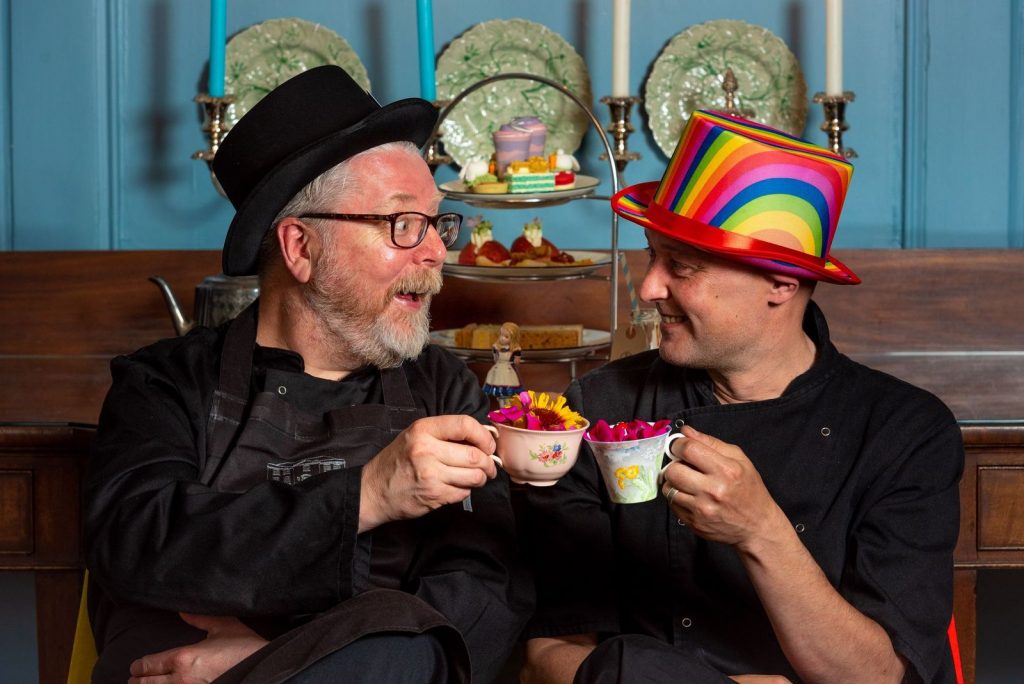
Our conversation moves on to the current situation with COVID-19, and Richard says that he believes that the next six months will see us return to something approaching normal. “People will want to come out again, they will want to celebrate personal events,” he says. “I am very confident for both Norwich and Norfolk as a whole with the hospitality industry. I think that less people will want to go abroad, and instead will spend time here with their families. At the moment, people are petrified of the virus, and we could all be more positive if we knew what we can/cannot do. We are not currently taking bookings for the proposed government opening date 4 July as it is not confirmed. I think that it will be tough. In a restaurant, all it takes is two or three bad weeks and you are in trouble – hence the reason these times are so difficult for so many. But I think that give it six months, and things will be recovering very well.”
One thing that Richard has loved all through his career in Norfolk is how local businesses always support each other. “I think that the people are genuinely supportive here,” he says. “Unlike some other parts of the world, all the Norfolk chefs are keen to see each other do well.
“I had a discussion with someone about chain restaurants, and I have no issue with them. I think that they have elevated many things within the way we run a restaurant. And I cannot bear food snobs. Food should be for everyone.
“I only buy local if it is better – I am afraid I really don’t see the point of buying it just because it is local. If I can get better pork in Suffolk, then I will. However, it just so happens that nine times out of 10, local is better!
“Norfolk is home, and I love everything about it, including the people. Norwich is a stunning city. People come here, to the UEA to study and they never leave. I love the coast, and I love the ingredients we can find here – not just asparagus and crab, but the amazing brewers and ice cream makers. It is such a supportive community.
“As for where I go… I love the Hippodrome Circus in Great Yarmouth. It is a beautiful building and Peter Jay, who owns it, loves it and has never missed a performance. I love to eat at The Terrace at the Imperial Hotel. The beach at Hunstanton remains a favourite, and while I have never drunk a pint of beer in my life, I like to go to The Duck Inn at Stanhoe. The chef there, Ben Handley, is a great guy.

Looking back, Richard cites getting the keys to Number 24 as one of the most exciting times. “I still vividly remember opening it,” he smiles. “The excitement, and getting the team in there… Other highlights include marrying Stacia at The Assembly House. I never eat in my own place as I cannot relax, but the staff really wanted to look after us, and they did so very well.
“Sometimes, you have to be prepared to take a risk and to do things that make you feel uncomfortable. What is the worst that can happen? Invariably, it is not life or death – but we do need to take chances. The last months have shown us that. I wish that I could have told myself that in my Number 24 days…
“As for the future, I won’t retire – I have no plans to do that. Even a morning off makes me anxious! And it is my obsession that has kept me going through harder times. But I would like to rewrite my book. I am also working on a one-man show, and that is fun. I want to spend more time with my wife. All things like that. And of course, there is still a lot more to do at The Assembly House! We released our Christmas programme today and are finalising the Food Festival for February.
“I am very happy at the moment. You rarely get all the balls in the air at the same time, but I feel as though I have – with Stacia, my girls and step-children, three football-obsessed grandsons who I see every week, The Assembly House, and my team. That is all that you can ask for.”
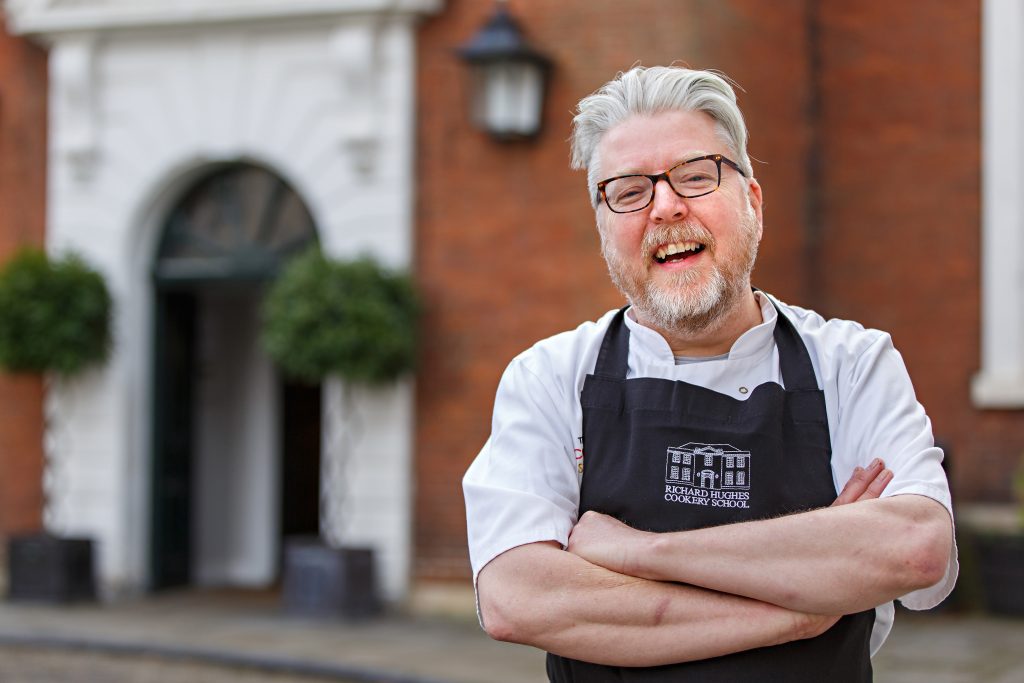
Finally, it is time to ask Richard to sum up all that he does and is, in one sentence. After a long pause, he says:
“I am lucky because I love what I do, and always have done.”
Richard is such an amazing person to speak to and his energy is infectious. While he may call himself lucky, there is no doubt that there has been a lot of hard work behind the scenes, and a lot of personal sacrifice. His generosity in worrying about the future generations of chefs, and sharing his invaluable knowledge with them, underlines just why this gentleman is so highly respected by so many across Norfolk. Above all, Richard shows no sign of slowing down and we should all be excited about what will come next from this gentle giant of the Norfolk food and drink scene.
Further reading
